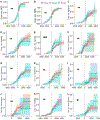Traumatic brain injury alters neuropsychiatric symptomatology in all-cause dementia
- PMID: 33470043
- PMCID: PMC8043985
- DOI: 10.1002/alz.12225
Traumatic brain injury alters neuropsychiatric symptomatology in all-cause dementia
Abstract
Introduction: Traumatic brain injury (TBI) may alter the course of neuropsychiatric symptom (NPS) onset during dementia development. The connection among TBI, NPS, and dementia progression is of increasing interest to researchers and clinicians.
Methods: Incidence of NPS was examined in participants with normal cognition who progressed to all-cause dementia based on whether TBI history was present (n = 130) or absent (n = 849). Survival analyses were used to examine NPS incidence across 7.6 ± 3.0 years of follow-up.
Results: Participants with TBI history had increased prevalence and incidence of apathy (44.7% vs 29.9%, P = .0062; HRadj. = 1.708, P = .0018) and motor disturbances (17.2% vs 9.5%, P = .0458; HRadj. = 2.023, P = .0168), controlling for demographics and type of dementia diagnosis. Earlier anxiety onset was associated with TBI (692 days prior to dementia diagnosis vs 161 days, P = .0265).
Discussion: History of TBI is associated with increased risk for and earlier onset of NPS in the trajectory of dementia development.
Keywords: Alzheimer's disease; acquired brain injury; all-cause dementia; anxiety; apathy; dementia; geriatric psychiatry; mild behavioral impairment; motor disturbances; neurodegeneration; neuropsychiatric symptoms; neuropsychiatry; traumatic brain injury.
© 2020 the Alzheimer's Association.
Conflict of interest statement
Figures


References
Publication types
MeSH terms
Grants and funding
- P50 AG005142/AG/NIA NIH HHS/United States
- P30 AG010133/AG/NIA NIH HHS/United States
- P50 AG047266/AG/NIA NIH HHS/United States
- P30 AG008017/AG/NIA NIH HHS/United States
- P30 AG010161/AG/NIA NIH HHS/United States
- P50 AG025688/AG/NIA NIH HHS/United States
- P50 AG005133/AG/NIA NIH HHS/United States
- P50 AG005138/AG/NIA NIH HHS/United States
- P50 AG047366/AG/NIA NIH HHS/United States
- P30 AG019610/AG/NIA NIH HHS/United States
- P30 AG028383/AG/NIA NIH HHS/United States
- P30 AG013854/AG/NIA NIH HHS/United States
- P30 AG053760/AG/NIA NIH HHS/United States
- P30 AG066444/AG/NIA NIH HHS/United States
- P30 AG062428/AG/NIA NIH HHS/United States
- P30 AG010124/AG/NIA NIH HHS/United States
- P50 AG023501/AG/NIA NIH HHS/United States
- P50 AG005146/AG/NIA NIH HHS/United States
- U24 AG072122/AG/NIA NIH HHS/United States
- P30 AG062421/AG/NIA NIH HHS/United States
- P30 AG035982/AG/NIA NIH HHS/United States
- P50 AG008702/AG/NIA NIH HHS/United States
- U01 AG016976/AG/NIA NIH HHS/United States
- P30 AG008051/AG/NIA NIH HHS/United States
- P50 AG005681/AG/NIA NIH HHS/United States
- P30 AG013846/AG/NIA NIH HHS/United States
- P50 AG047270/AG/NIA NIH HHS/United States
- P30 AG062429/AG/NIA NIH HHS/United States
- P50 AG005136/AG/NIA NIH HHS/United States
- P30 AG049638/AG/NIA NIH HHS/United States
- P30 AG012300/AG/NIA NIH HHS/United States
- P30 AG062422/AG/NIA NIH HHS/United States
- P50 AG016573/AG/NIA NIH HHS/United States
- P30 AG062715/AG/NIA NIH HHS/United States
- P30 AG010129/AG/NIA NIH HHS/United States
LinkOut - more resources
Full Text Sources
Other Literature Sources
Medical

